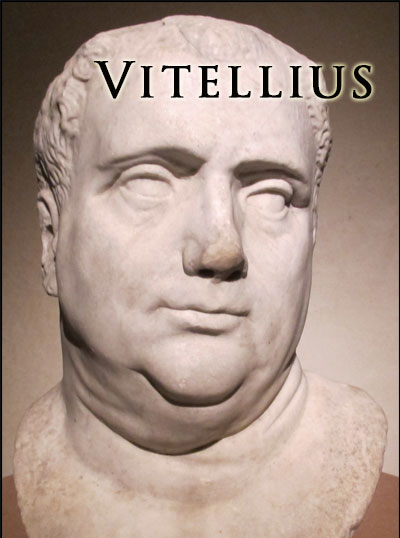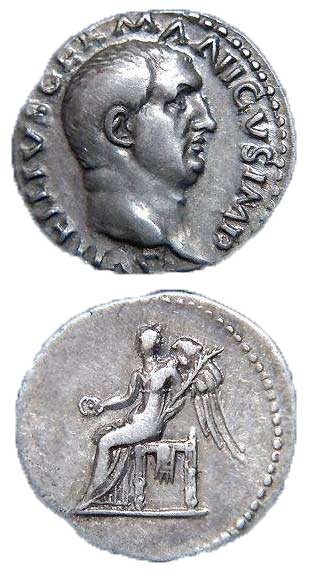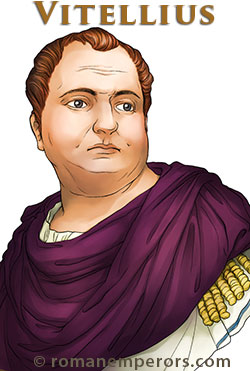Roman Emperor Vitellius
69 A.D.
Aulus Vitellius Germanicus Augustus
Busts, Statues, Coins, Information, Maps, Images, and More

A Short Reign, Long Shadow: The Tumultuous Life and Legacy of Vitellius
Aulus Vitellius, who reigned as Roman emperor for a mere eight months in 69 AD, stands as a stark symbol of the chaos and intrigue that marked the Year of the Four Emperors. His story, while brief, is a fascinating one, filled with ambition, indulgence, and a brutal end.
From Senatorial Son to Governor
Born in 15 AD, Vitellius came from a family with some political clout. His father, Lucius Vitellius, held the prestigious position of consul and even enjoyed a close relationship with Emperor Tiberius. However, the Vitellii were not considered amongst the highest nobility. Despite this, young Aulus secured a comfortable life, befriending the likes of the infamous Caligula.
Vitellius' political career progressed steadily. He obtained the consulship in 48 AD and later served as governor of the African province. Historians paint a mixed picture of his governorship. While some accounts praise his administrative skills, others portray him as indulging in excessive extravagance and gluttony, a characteristic that would follow him throughout his life.
The Year of the Four Emperors and the Rise of Vitellius
The year 68 AD marked a turning point for Vitellius. Emperor Nero's reign crumbled, leading to a period of civil war known as the Year of the Four Emperors. Galba, a respected senator, emerged as the first successor. However, his frugal ways and failure to reward his troops alienated the army stationed in Germania Inferior, where Vitellius held command.
Sensing an opportunity, Vitellius' ambitious advisors and disgruntled soldiers proclaimed him emperor on January 2nd, 69 AD. News of this rebellion reached Rome, prompting Galba to adopt a young noble named Piso Licinianus as his heir. Unfortunately for them, the Praetorian Guard, ever seeking power and financial gain, betrayed Galba and Otho, who briefly succeeded him, and declared their allegiance to Vitellius.
A March on Rome and a Short-Lived Reign
Vitellius' forces marched south towards Rome, defeating Otho's army at the Second Battle of Bedriacum. Otho, realizing defeat, committed suicide, leaving the path to Rome clear for Vitellius. He entered the capital in April of 69 AD and was officially recognized as emperor by the Senate.
Vitellius' reign was marked by indulgence and brutality. He was notorious for his extravagant feasts, some rumored to include multiple courses of exotic dishes. This, coupled with his military background, did little to endear him to the Roman populace. Furthermore, his troops, known for their undisciplined behavior, plundered the city, further eroding public support.
A Downfall and a Grisly Demise
Meanwhile, in the eastern provinces, another contender for the throne emerged – Vespasian, a seasoned military commander. Vitellius, however, underestimated the threat. By the end of 69 AD, Vespasian's forces had reached Italy and decisively defeated Vitellius' army at the Second Battle of Bedriacum.
Vitellius, realizing his defeat, attempted to abdicate but was apprehended by the victorious forces. On December 20th, 69 AD, he met a brutal end. Dragged through the streets of Rome, he was eventually beaten and stabbed to death before being thrown into the Tiber River. His reign, marked by ambition and excess, had come to a bloody and humiliating conclusion.
The Legacy of Vitellius
Vitellius' reign, though short, casts a long shadow on Roman history. He serves as a reminder of the instability and violence that can erupt during times of political upheaval. His reputation as a gluttonous and cruel leader stands in stark contrast to the more benevolent emperors who followed. However, his story also highlights the precarious nature of power in ancient Rome, where loyalty and ambition could be as fleeting as the fortunes of war.

More to Come

"Glutton"
Vitellius defeated Otho and made himself Emperor of the Roman Empire. His throne lasted 8 months and when Vespasian was heralded as Emperor by the legions at Africa and Judaea he came to face Vitellius. Vitellius had much less military experience and he was defeated and killed by Vespasian. This all happened in the year 69 A.D., and this was referred to as the Year of the Four Emperors - Galba, Otho, Vitellius, and Vespasian. Vitellius spent much of his youth on the Island of Capri with the corrupt Tiberius. Suetonius referred to Vitellius and his two vices, he was a "Glutton" and a "Gambler." In one year the Roman empire had witnessed the death of Nero, the accession of Galba and Otho and then the deaths of them both. They also witnessed the accession of Vitellius with all his debauchery and then his gruesome death. Then shortly after they witnessed the proclamation of Vespasian, this all happened in one year... 69 A.D.

















Latest




Popular




Useful




